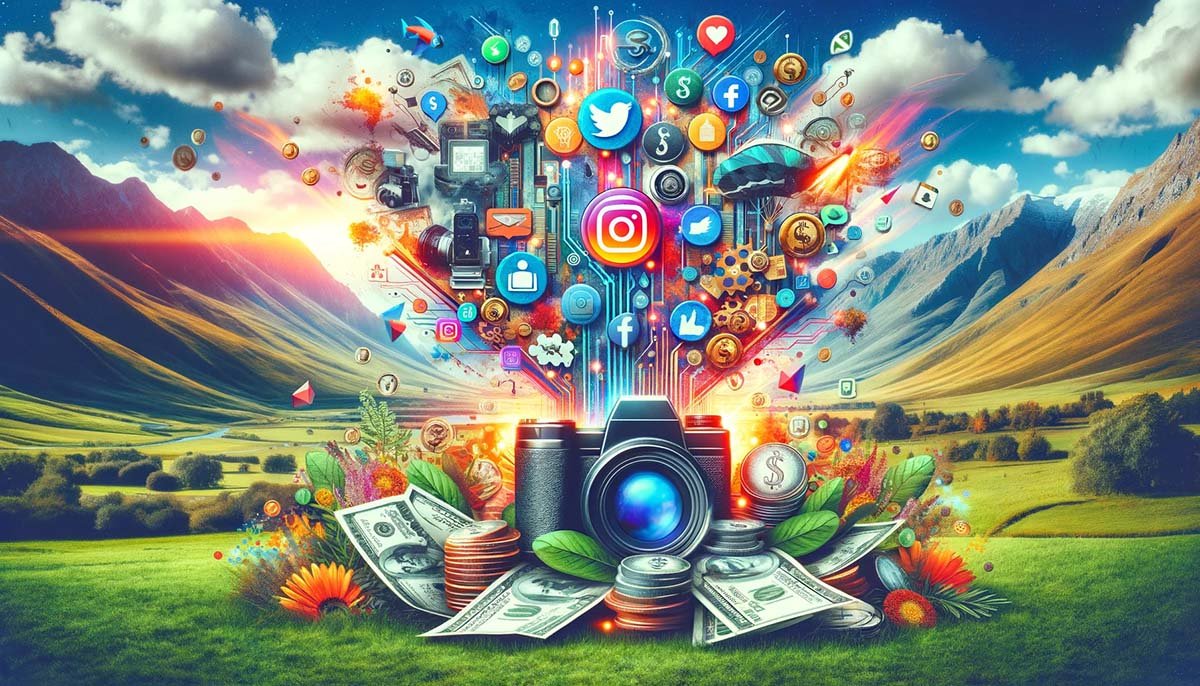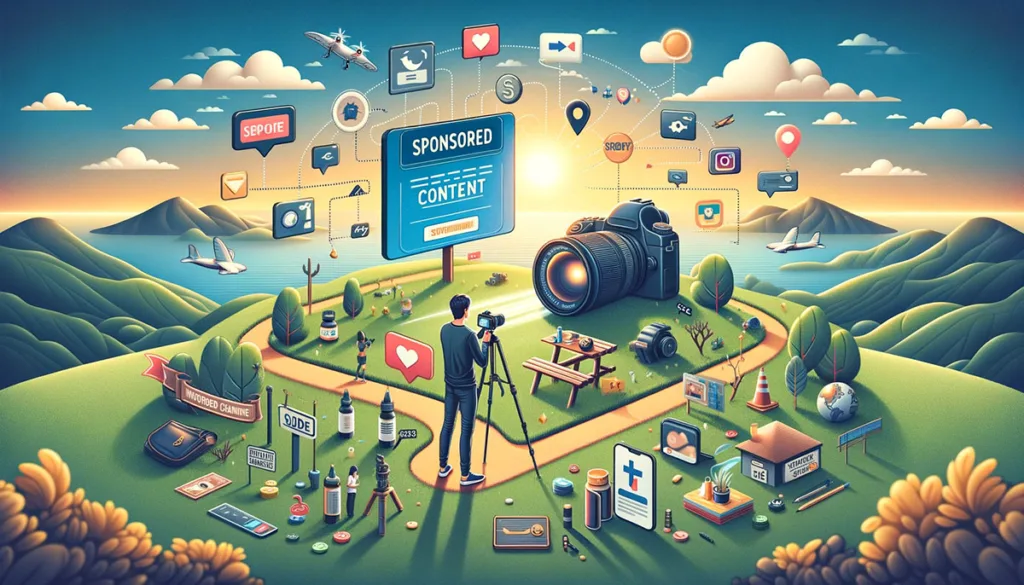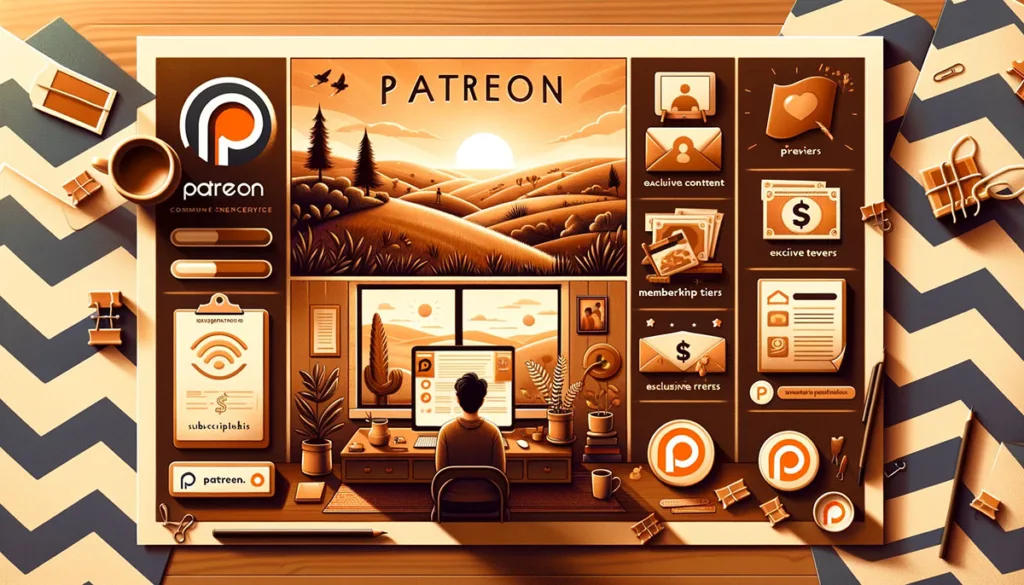20 Ways to Make Money as A Social Media Influencer

1. Introduction
Being a social media influencer isn’t just about accumulating followers and likes. It’s about transforming that influence into a sustainable income. In today’s digital era, brands are keen to collaborate with influencers to reach their target audience authentically. This article delves into 20 innovative strategies for social media influencers to monetize their platforms and maximize their earning potential.
Defining Social Media Influence
Social media influencers have established credibility in a specific niche and possess a loyal audience who engage with their content regularly. These influencers have the power to affect the purchasing decisions of their followers due to their authority, authenticity, and reach.
The Growth of Influencer Marketing
The influencer marketing industry has experienced exponential growth in recent years, with brands allocating significant budgets to collaborate with influencers. This surge is attributed to the effectiveness of influencer marketing in driving brand awareness, engagement, and sales.
The Importance of Diversifying Income Streams
Relying solely on one source of income as an influencer can be risky. Diversifying income streams ensures financial stability and increases revenue generation opportunities. By exploring various monetization avenues, influencers can mitigate risks associated with fluctuations in platform algorithms or market trends.
2. Sponsored Content

Sponsored content is a cornerstone of influencer marketing, wherein influencers collaborate with brands to create promotional posts or videos. These collaborations can take various forms, including product reviews, sponsored stories, or brand endorsements.
Collaborating with Brands
Influencers often partner with brands whose values align with their own and resonate with their audience. These collaborations typically involve negotiating compensation, deliverables, and timelines to ensure a mutually beneficial partnership.
Negotiating Rates and Terms
Determining fair compensation for sponsored content can be challenging. The influencer’s reach, engagement rate, content quality, and exclusivity influence the negotiation process. Influencers must advocate for their worth, considering the brand’s budget and objectives.
Maintaining Transparency
Maintaining transparency is paramount in sponsored content collaborations to preserve the trust and authenticity of the influencer’s relationship with their audience. Clear disclosures, such as using #ad or #sponsored, help distinguish sponsored content from organic posts.
3. Affiliate Marketing

Affiliate marketing allows influencers to earn commission by promoting products or services and driving sales through unique affiliate links. This performance-based model rewards influencers for converting their audience into customers.
Joining Affiliate Programs
Influencers can join affiliate programs offered by brands, e-commerce platforms, or affiliate networks relevant to their niche. These programs provide influencers access to a wide range of products or services to promote to their audience.
Creating Compelling Content
Success in affiliate marketing hinges on influencers’ ability to create engaging content that resonates with their audience and motivates them to take action. Strategies such as product reviews, tutorials, or curated lists can effectively drive conversions.
Tracking and Optimizing Performance
To maximize earnings from affiliate marketing, influencers should regularly monitor the performance of their affiliate links. Analyzing metrics such as click-through rate, conversion rate, and revenue generated allows influencers to identify top-performing content and optimize their strategies accordingly.
Explore our latest insights and stories on our blog.
4. Brand Ambassadorships

Becoming a brand ambassador involves establishing long-term partnerships with companies to represent their brand authentically. Brand ambassadors often receive exclusive perks and benefits in exchange for promoting the brand’s products or services to their audience.
Forging Long-Term Partnerships
Brand ambassadorships are built on trust, mutual respect, and shared values between the influencer and the brand. These partnerships typically involve a contractual agreement outlining the ambassador’s responsibilities, compensation, and duration of the partnership.
Enjoying Exclusive Perks
In addition to financial compensation, brand ambassadors often receive exclusive perks such as free products, VIP access to events, or personalized discounts. These benefits enhance the ambassador’s relationship with the brand and reinforce their commitment to promoting it.
Showcasing Authenticity
Maintaining authenticity is crucial for brand ambassadors to preserve their credibility and trustworthiness with their audience. Ambassadors should only endorse products or services that align with their brand and genuinely believe will benefit their followers.
5. Product Collaborations

Product collaborations empower influencers to create and launch products or co-create offerings with established brands. These collaborations leverage the influencer’s creativity, expertise, and audience to develop unique and marketable products.
Developing Personal Brands
Launching branded products allows influencers to extend their brand beyond digital content and engage with their audience more deeply. Whether it’s merchandise, digital courses, or physical products, influencers can monetize their expertise and creativity through product collaborations.
Co-Creating with Brands
Collaborating with brands to co-create products allows influencers to leverage the brand’s resources, expertise, and existing customer base. These partnerships often result in innovative product offerings that appeal to the influencer’s audience and the brand’s target market.
Driving Product Sales
Effective promotion is essential to driving sales and maximizing revenue from product collaborations. Influencers can leverage various marketing channels, including social media, email newsletters, and dedicated launch events, to generate buzz and excitement around the product.
6. Sponsored Events and Appearances

Influencers can monetize their presence by participating in sponsored events, hosting meetups, or charging appearance fees for speaking engagements or brand activations. These opportunities allow influencers to connect with their audience in person and strengthen their brand partnerships.
Attending Sponsored Events
Brands often invite influencers to attend events, product launches, or trade shows to showcase their products or services to a captive audience. In exchange, influencers may receive compensation, travel expenses, or complimentary access to the event.
Hosting Meetups and Workshops
Influencers can organize meetups, workshops, or masterclasses to engage with their audience in a more intimate setting. These events provide valuable opportunities for influencers to interact with their followers, share their expertise, and cultivate a sense of community.
Charging Appearance Fees
Established influencers with a strong personal brand and significant following may command appearance fees for speaking engagements, brand endorsements, or public appearances. These fees reflect the influencer’s value, expertise, and ability to attract and engage an audience.
7. Exclusive Content and Memberships

Offering exclusive content and memberships allows influencers to provide additional value to their most dedicated followers while generating recurring revenue. Platforms like Patreon enable influencers to monetize their content and cultivate a loyal community of supporters.
Offering Premium Content
Influencers can create premium content such as behind-the-scenes footage, exclusive tutorials, or members-only Q&A sessions to incentivize fans to subscribe to their membership program. This exclusive content connects fans to the influencer and enhances their overall experience.
Creating Membership Platforms
Platforms like Patreon provide influencers with a dedicated space to offer subscription-based memberships to their audience. Influencers can set subscription tiers, providing different benefits and perks to cater to a diverse range of fans and monetize their content effectively.
Monetizing Private Communities
In addition to exclusive content, influencers can foster a sense of community by creating private groups or forums where members can interact with each other and the influencer. These communities offer fans a unique opportunity to connect with like-minded individuals and access personalized support and advice from the influencer.
8. Sponsored Reviews and Collaborations
Many brands will pay influencers for sponsored reviews, collaborations, or sponsored content series. These partnerships allow brands to leverage the influencer’s credibility and reach to authentically promote their products or services.
Reviewing Products or Services
Influencers can partner with brands to review their products or services on social media, blogs, or YouTube channels. These reviews should be honest and authentic and provide valuable insights to the influencer’s audience to maintain credibility and trust.
Collaborating on Sponsored Content
In addition to standalone reviews, influencers can collaborate with brands on sponsored content series, campaigns, or activations. These collaborations often involve creating custom content that aligns with the brand’s messaging, objectives, and target audience.
Maintaining Credibility and Transparency
Transparency is critical in sponsored reviews and collaborations to ensure the influencer’s audience knows about paid partnerships or endorsements. Clear disclosures, such as #ad or #sponsored, help maintain transparency and preserve the influencer’s authenticity and integrity.
9. Sponsored Travel and Experiences

For influencers who love to travel, sponsored travel and experiences present an exciting opportunity to monetize their passion while exploring new destinations and creating compelling content for their audience.
Partnering with Tourism Boards and Travel Brands
Tourism boards, hotels, airlines, and travel brands often collaborate with influencers to promote destinations, experiences, or travel-related products. These partnerships typically involve sponsored trips, accommodations, activities, and in-kind contributions for exposure on the influencer’s social media channels.
Documenting Travel Experiences
Influencers can leverage their creativity and storytelling skills to document their travel experiences through captivating photos, videos, and stories. Authentic and visually appealing content inspires followers to explore new destinations, try new experiences, and engage with the influencer’s journey.
Negotiating Travel Sponsorships
Negotiating travel sponsorships requires influencers to articulate their value proposition, audience demographics, and content deliverables effectively. Clear communication, mutual understanding, and a well-defined agreement are essential to establishing successful partnerships and ensuring a positive experience for the influencer and the brand.
10. Freelance Content Creation
In addition to collaborating with brands, influencers can offer their content creation services on a freelance basis to brands, agencies, or individuals looking to enhance their online presence and engage their target audience effectively.
Providing Content Creation Services
Influencers can leverage their content creation, storytelling, and audience engagement expertise to offer various services, including social media content creation, blog writing, photography, videography, graphic design, and influencer collaborations.
Writing Sponsored Blog Posts or Articles
Influencers with strong writing skills can partner with brands, publications, or digital platforms to create sponsored blog posts, articles, or guest contributions. These collaborations allow influencers to share their expertise, insights, and opinions on topics relevant to their audience while earning compensation for their work.
Creating Visual Content
Visual content such as photography, videography, and graphic design plays a crucial role in capturing attention, conveying messages, and evoking emotions. Influencers can offer visual content creation services to brands, agencies, or individuals looking to enhance their marketing collateral and brand identity.
11. Influencer Merchandise
Creating and selling merchandise is a popular way for influencers to monetize their brand, connect with their audience on a deeper level, and generate additional revenue streams beyond sponsored content and partnerships.
Designing Branded Merchandise
Influencers can leverage their creativity, personality, and unique brand identity to design and launch branded merchandise, including apparel, accessories, digital products, and limited-edition collectibles. These products serve as tangible expressions of the influencer’s brand and enable fans to show their support and loyalty.
Using Print-on-Demand Services
Print-on-demand services offer influencers a low-risk and cost-effective way to create and sell merchandise without needing inventory, fulfillment, or upfront investment. Influencers can design and customize products online, and print-on-demand providers handle production, shipping, and customer service on their behalf.
Promoting Merchandise
Effective promotion is essential to driving sales and maximizing revenue from influencer merchandise. Influencers can leverage their social media platforms, email newsletters, websites, and live events to showcase their merchandise, share behind-the-scenes stories, and encourage fans to purchase.
12. Speaking Engagements and Workshops
Influencers who are experts in their niche can monetize their knowledge and expertise through speaking engagements, workshops, seminars, or online courses. These opportunities allow influencers to share their insights, inspire others, and establish themselves as thought leaders in their industry.
Hosting Seminars and Workshops
Influencers can organize and host seminars, workshops, masterclasses, or training sessions on topics related to their niche expertise. These events provide attendees valuable insights, actionable strategies, and practical advice to help them achieve their goals and overcome challenges.
Speaking at Industry Events
Influencers may be invited to speak at industry conferences, summits, panels, or networking events to share their expertise, participate in discussions, and connect with other professionals in their field. These speaking engagements give influencers valuable exposure, networking opportunities, and credibility within their industry.
Charging Speaking Fees
Established influencers with a strong personal brand, expertise, and track record of success may command speaking fees for their appearances at events, conferences, or corporate gatherings. These fees compensate influencers for their time, preparation, travel, and the value they provide to the event organizers and attendees.
13. Social Media Consultation
Given their expertise in building and engaging audiences, influencers are well-positioned to offer social media consultation services to brands, businesses, or individuals seeking to optimize their online presence, grow their following, and increase engagement.
Providing Consulting Services
Influencers can leverage their experience, insights, and industry knowledge to provide strategic guidance, customized recommendations, and actionable insights to clients looking to improve their social media strategy, content creation, community management, and influencer partnerships.
Auditing Social Media Accounts
Influencers can comprehensively audit clients’ social media accounts to assess their strengths, weaknesses, opportunities, and threats. These audits typically involve analyzing key metrics, content performance, audience demographics, competitor analysis, and industry trends to identify areas for improvement and optimization.
Packaging Expertise in Coaching Programs
Influencers can package their expertise into coaching programs, online courses, or workshops designed to empower clients with the knowledge, skills, and tools needed to succeed in social media marketing. These programs provide clients valuable resources, ongoing support, and actionable strategies to achieve their goals and drive results.
14. Sponsored Giveaways and Contests
Hosting sponsored giveaways and contests is a powerful way for influencers to engage their audience, drive excitement, and generate buzz around brands, products, or promotions while providing value to their followers.
Partnering with Brands
Influencers can collaborate with brands to organize sponsored giveaways or contests that offer participants prizes, incentives, or exclusive experiences. These partnerships enable brands to increase brand awareness, reach new audiences, and generate user-generated content through social sharing and engagement.
Running Engaging Campaigns
Influencers can design creative and compelling campaigns encouraging participation, interaction, and excitement among their audience. Strategies like user-generated content challenges, photo/video contests, quiz or trivia competitions, or hashtag campaigns can spark enthusiasm and drive engagement.
Ensuring Compliance and Fairness
Influencers must adhere to relevant laws, regulations, and platform policies to host sponsored giveaways or contests to ensure compliance, transparency, and fairness. Clear guidelines, rules, and terms of participation help maintain integrity, trust, and credibility with the audience while minimizing legal risks and liabilities.
15. Patreon or Subscription Services

Platforms like Patreon provide influencers with the tools and infrastructure to monetize their content, cultivate a loyal community, and offer exclusive perks, rewards, or membership tiers to their most dedicated fans and supporters.
Creating Subscription Tiers
Influencers can create multiple subscription tiers on Patreon, each offering different benefits, perks, or rewards to subscribers. These tiers may include exclusive content, behind-the-scenes access, personalized interactions, merchandise discounts, or early access to new releases.
Providing Exclusive Content
Exclusive content is a primary incentive for fans to subscribe to an influencer’s Patreon membership. Influencers can share premium content such as bonus videos, extended interviews, private livestreams, or members-only podcasts that provide additional value and deepen the connection with subscribers.
Growing and Retaining Subscribers
Consistently delivering value, engaging with subscribers, and fostering community are key to growing and retaining subscribers on Patreon. Influencers can interact with their audience through comments, messages, polls, or Q&A sessions, solicit feedback, and adapt their content based on subscriber preferences and interests.
16. Monetizing Live Streaming
With the rise of live streaming platforms like Twitch, YouTube Live, and Facebook Live, influencers can monetize their live content through various means, including sponsored streams, affiliate links, donations, or premium subscriptions.
Hosting Sponsored Streams
Influencers can collaborate with brands to host sponsored live streams that showcase their products, services, or promotions to a live audience. These sponsored streams allow brands to engage with consumers in real time, demonstrate product features, and drive sales through interactive Q&A sessions or product demonstrations.
Integrating Affiliate Links or Donations
Influencers can monetize their live streams by integrating affiliate links, donation buttons, or virtual tip jars into their broadcast. Viewers can support the influencer by making direct contributions, purchasing recommended products through affiliate links, or sending virtual gifts or donations during the stream.
Building a Loyal Audience
Building a loyal and engaged audience is essential for success in live streaming. Influencers can foster a sense of community, interact with viewers in real time, and provide entertaining, informative, or valuable content that keeps audiences coming back for more.
17. Sponsored Social Media Takeovers
Taking over brands’ social media accounts for a day can be a fun and lucrative opportunity for influencers to showcase their creativity, engage with a new audience, and promote brands, products, or campaigns authentically and compellingly.
Engaging the Brand’s Audience
During a social media takeover, influencers can create and share content that resonates with the brand’s audience while maintaining their unique voice, style, and personality. This content may include behind-the-scenes footage, product tutorials, user-generated content, or interactive polls and Q&A sessions.
Negotiating Compensation
Influencers should negotiate fair compensation for social media takeovers based on factors such as the duration of the takeover, the scope of deliverables, the size and engagement of the brand’s audience, and the influencer’s expertise and influence. Clear communication and a well-defined agreement help ensure a mutually beneficial partnership.
Preserving Authenticity
Maintaining authenticity is crucial in social media takeovers to preserve the influencers’ and brands’ trust and credibility. Influencers should align their content with the brand’s messaging and values while injecting their unique perspective, creativity, and personality to create engaging and memorable experiences for the audience.
18. Podcast Sponsorships
Podcast sponsorships allow influencers to monetize audio content by integrating sponsored messages, ads, or endorsements into podcast episodes. These partnerships give brands a unique platform to reach a highly engaged and captive audience.
Integrating Sponsored Messages
Influencers can seamlessly integrate sponsored messages, ads, or endorsements into their podcast episodes in a way that aligns with their content’s tone, style, and format. Host-read ads, pre- or mid-roll placements, and branded segments are standard formats for podcast sponsorships.
Partnering with Relevant Sponsors
Influencers should seek out sponsors whose products, services, or messaging resonate with their audience and align with the theme or topic of their podcast. Relevant sponsors are more likely to generate interest, engagement, and conversions among listeners, resulting in a more successful partnership for both parties.
Pitching Effectively
Influencers should clearly articulate their podcast’s value proposition, audience demographics, and engagement metrics to potential sponsors when pitching podcast sponsorships. Customizing proposals, providing case studies, and demonstrating the impact of previous sponsorships can help influencers stand out and secure lucrative partnerships.
19. Stock Photography and Video Sales
Influencers with expertise in photography or videography can monetize their content by licensing it for commercial use on stock image and video platforms. These platforms provide a global marketplace for influencers to sell their pictures and videos to businesses, marketers, and content creators.
Selling on Stock Image Sites
Influencers can upload their high-quality images to stock image sites such as Shutterstock, Adobe Stock, or Getty Images, which are available for licensing to customers worldwide. These platforms handle the licensing, distribution, and payment processing on behalf of the influencer, allowing them to focus on creating new content.
Licensing for Commercial Use
Businesses, marketers, and content creators can license influencer-generated images and videos for various commercial purposes, including advertising, marketing campaigns, website design, social media posts, and editorial content. Licensing agreements typically specify usage rights, royalties, and exclusivity terms to protect the interests of both parties.
Creating In-Demand Content
To maximize earnings from stock photography and video sales, influencers should create high-quality, visually appealing content that meets the needs and preferences of customers on stock image sites. Understanding market trends, customer preferences, and keyword optimization techniques can help influencers create in-demand content that attracts buyers and generates sales.
20. Continuous Learning and Adaptation
Influencers must stay updated on industry trends, best practices, and emerging technologies to remain relevant and competitive as the digital landscape evolves. Continuous learning, experimentation, and adaptation are essential for long-term success as a social media influencer.
Staying Updated on Industry Trends
Influencers should actively consume industry news, follow thought leaders, and participate in online communities and forums to stay informed about the latest trends, developments, and innovations in social media marketing, influencer culture, and digital entrepreneurship.
Experimenting with New Monetization Strategies
Influencers should be open to experimenting with new monetization strategies, platforms, and revenue streams to diversify their income, reach new audiences, and capitalize on emerging opportunities. Testing, analyzing results, and iterating based on feedback help influencers identify what works best for their brand and audience.
Evolving Brand and Content
Influencers should continuously evaluate and refine their personal brand, content strategy, and engagement tactics to adapt to changes in audience preferences, platform algorithms, and market dynamics. Flexibility, creativity, and resilience are key to navigating uncertainties and seizing opportunities for growth and expansion.
Conclusion
In conclusion, social media influencers have many opportunities to monetize their platforms and maximize their earning potential. Influencers can build sustainable and lucrative careers by diversifying income streams, cultivating authentic connections with their audience, and staying agile in a rapidly evolving digital landscape. Remember, success as an influencer isn’t just about gaining followers—it’s about delivering value, fostering engagement, and making a meaningful impact on the lives of your audience.
